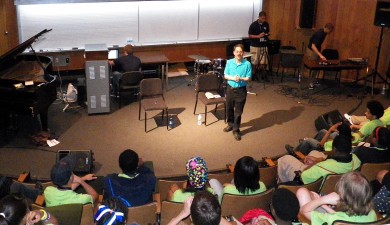Teens meet Cab and Dizzy, thanks to Chicago Tribune critic
As a guest instructor in the UIC/Chicago Jazz Philharmonic summer camp, Reich shared the talents everyone knows about. He took a time-honored approach, showing teen musicians several videos of legendary artists in different eras and styles to teach “the positive effect of criticism.”
A 1930s clip of Cab Calloway leading his band in “Minnie the Moocher” caused some of Reich’s audience to giggle. Eventually, they started singing along with the famous “hidey hidey hidey hi” chorus.
One student wondered aloud why many of the instrumentalists were singing — not playing — and mugging for the camera.
“It’s a period piece, and that’s a good sociological point,” Reich told student musicians at the camp, held July 16 to 27 on campus.
In another clip, Ella Fitzgerald sang “It Don’t Mean a Thing (If It Ain’t Got That Swing).” Reich noted that each soloist “said what they had to say, then gave it to someone else. They know when it’s too much.”
A student responded that it was like a free throw — “different each time.”
“This is why the world fell in love with jazz,” Reich said. “No other art form was so spontaneous. It made America famous culturally.”
A clip of Dizzy Gillespie playing “Manteca” raised a pointed criticism.
“That guy kept blowing up his cheeks. And they kept showing it, like a science fiction movie,” a student said.
After explaining Gillespie’s signatures — inflated cheeks and an upward-bent trumpet — Reich pointed out the music’s “layers of rhythm, with Afro-Cuban tensions and intensity.”
“Dizzy said the bass, not the trumpet, is the most important instrument,” he said.
Reich told stories about the interviews that sometimes inform his critical writing. He said he and his grandfather were lifelong Calloway fans, yet Reich found Calloway “the worst interview ever” because he’d give only monosyllabic answers while the tape recorder was running.
“Afterward, he volunteered to drive me and my wife to the train station. When the tape recorder was off, he told all these wild stories,” Reich recalled.
“You get to know the musicians. And some eventually don’t want to talk to you,” he said.
Asked whether he’d ever jump-started a career, Reich didn’t name names, but Orbert Davis — renowned trumpeter, Chicago Jazz Philharmonic founder, UIC clinical associate professor and jazz camp director — chimed in.
“You’re looking at one of them,” Davis said.
Another student asked Reich whether a performer had ever threatened him after a review.
He recalled an angry sideman who led a letter-writing campaign and came to Reich’s office to complain that Reich’s brief mention had ruined his career.
“I told him, ‘You’re making me way too important. Concentrate on what you want, and what your fans want.’ He answered, ‘What’s wrong with my playing?’ He missed the point,” Reich said.
“I don’t see any review as bad or good,” he concluded.
“I describe what happened, and try to make the readers feel like they were there.”

